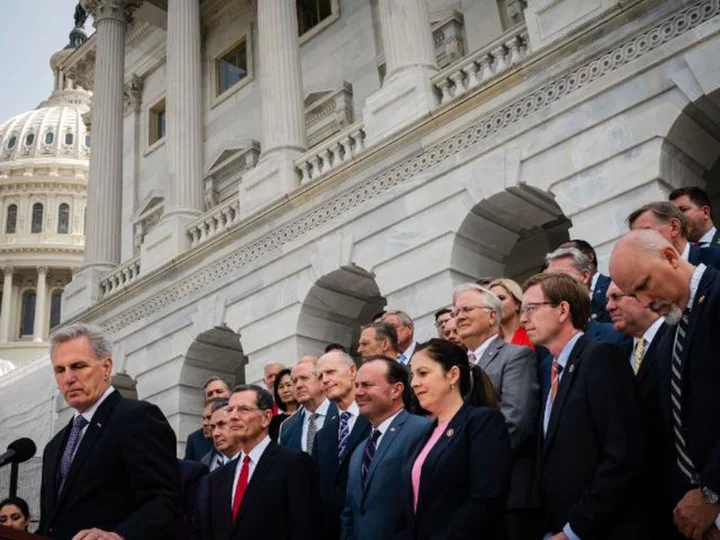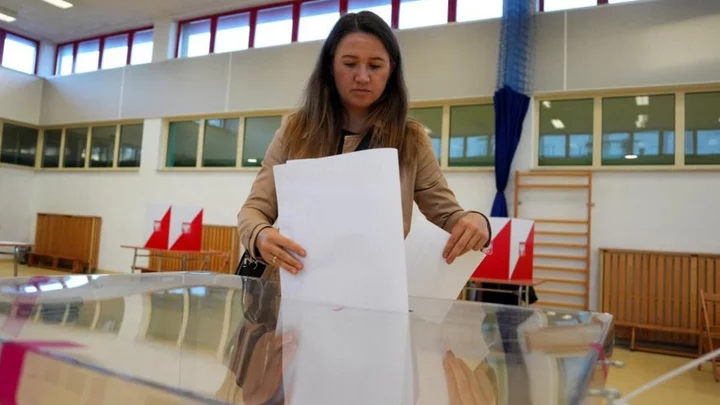The countdown is on, the stakes are high -- and there is still no debt limit deal.
President Joe Biden and House Speaker Kevin McCarthy are slated to meet again Monday, following a weekend notable for its lack of progress in trying to reach a deal to avoid the country's first-ever default on its debt.
Negotiations between the White House and the House GOP hit a snag and were put on pause Friday, and representatives of each side spent most of the next two days criticizing the other while defending their own positions.
In a sign of a possible thaw, Biden and McCarthy spoke over the phone as the president was aboard Air Force One, heading back to Washington after a shortened trip to Japan. McCarthy told reporters Sunday that the call was "productive." But that came after Biden had sharply criticized Republicans at a news conference in Hiroshima, where he said he wasn't able to promise fellow world leaders gathered for Group of Seven talks that the US would not default.
"I can't guarantee that they will not force a default by doing something outrageous," Biden said shortly before his departure tor the US.
It's not uncommon for high-stakes negotiations on Capitol Hill to encounter setbacks and later recover, but the weekend-long snag underscored the challenge of finding consensus between the two sides as key sticking points remain.
Time is running short to raise the nation's borrowing limit and the US could default as soon as June 1, the Treasury Department has warned, a position that Treasury Secretary Janet Yellen repeated on Sunday. If lawmakers and the White House are unable to reach a deal, a global economic catastrophe would likely be triggered.
Congressional timeline
On Sunday, McCarthy told reporters at the Capitol that GOP Reps. Garret Graves of Louisiana and Patrick McHenry of North Carolina would begin conversations again with White House staff "so we can walk them through literally what we've been talking about."
If and when a deal is reached, there will still be major challenges ahead to successfully pass it in the House and Senate.
Legislative text will need to be written, which can be arduous and complicated work as lawmakers and staff dive into nitty-gritty policy details -- and can often lead to further issues over the fine print.
Then leaders from both parties will need to wrangle the votes to pass a bill, no small task with narrow majorities in both chambers.
On top of all that, there are a steadily dwindling number of days left on the calendar before June 1.
McCarthy said the House would need four days to push legislation through. In the Senate, opponents of a deal could cause a multi-day delay through a filibuster. But both chambers are capable of accelerating timelines when necessary.
Key sticking points and potential areas of consensus
House Republicans are seeking spending cuts in the federal budget in exchange for their support to raise the debt ceiling. On Sunday, Biden acknowledged "significant" disagreement with Republicans, insisting that while he's willing to reduce spending, tax "revenue is not off the table" as part of the deal.
Graves, who is leading GOP negotiations on the debt ceiling, earlier this month outlined four areas where he thought there could be agreement: revising the permitting process, clawing back unspent Covid relief funds, bolstering work requirements for some government aid programs and capping spending.
Republicans have long insisted they won't raise the debt limit without spending reductions, but Democrats have sounded the alarm over the cuts Republicans want.
Sources familiar with the White House's thinking acknowledge that part of the reason for the temporary breakdown in talks Friday is that White House negotiators view the extent of the spending reductions House Republicans are pushing for as unacceptable, though the White House has expressed a willingness to cut some spending.
The budget proposal GOP negotiators presented over the weekend would set budget caps for six years, with the cap structure remaining the same as the House-passed bill at fiscal year 2022 levels, according to a source with direct knowledge of the matter.
The proposal included at least two items that weren't part of their initial bill: immigration provisions and additional changes to the work requirements for food stamps, the source said.
Biden said Sunday that much of what Republicans have proposed "is simply, quite frankly, unacceptable."
Changes to work requirements have become a contentious issue. Some Democrats have expressed concern about Republicans' proposed enhancement of work requirements for social safety net programs, with some leading Democrats suggesting the inclusion of the requirements is a red line in negotiations. Biden has said he would not put consequential work requirements on the table for negotiations.
Democrats are also pushing for a minimum two-year extension of the debt limit so they don't have to wrestle with the issue again before the 2024 elections. The length of the extension -- as with most of the items that are part of the talks -- has not been finalized, according to a source familiar.









